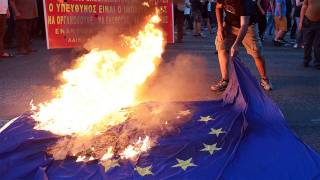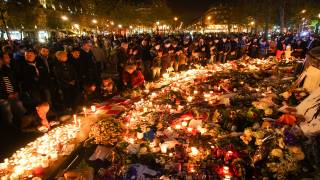Terrorist behind Brussels and Paris attacks says EURO 2016 is key ISIS target
The European Championships in France this summer is a major jihadi target, according to a member of the ISIS terror cell that carried out the deadly attacks in Paris and Brussels.
More than 2.5m supporters, including tens of thousands of British and Irish fans, are expected to attend the continent's flagship football event, making the tournament a huge potential target for the Islamic terrorists.
Mohamed Abrini, who was arrested following the bloody Belgian attacks earlier this month, has now told police about the planned attack, although prosecutors are refusing to reveal details.
A police source said: "If the Abrini statements are correct, it just confirms the fact that Belgium is an operational base that needs to be watched even more intensely.
"Jihadi networks and cells have been meeting there for at least 10 years."
Abrini, a Belgian-Moroccan national, was one of six people arrested last week in connection with the Brussels attacks, which left 32 dead. He was also wanted in connection with the Paris attacks last November.
His fingerprints were found in two safe houses in Belgian linked to the terrorists, and his warning is sure to worry authorities across Europe.
French Prime Minister Manuel Valls said: "It's extra proof of the very high threats to the whole of Europe and to France in particular. We will not let our guard down."
Abrini's open threat to the tournament will bring back chilling memories of last November's deadly attacks in Paris, in which 137 people were killed in a series of explosions and shootings - including one at the Stade de France, which is due to hold this summer's high-profile final.
One innocent civilian was killed when three suicide bombers blew themselves up near the stadium on November 13 while a friendly match was being played between France and Germany
The televised footage of footballers and fans responding with confusion to the sound of explosions chilled viewers, and will be in the minds of organisers as they seek to protect fans this summer.
Ireland manager Martin O'Neill has already admitted that proposals to play the tournament without any fans present may be necessary for the "safety of the people."
He said after the attacks in Brussels: "If someone wants to make an attack as happened yesterday, it’s very, very difficult to deal with that, but overall the security that we’re being provided with is really excellent and like everything else, I’d comply with anything that is happening.
"There’s talk about matches being played behind closed doors, but the safety of people is of paramount importance and anything that is agreed upon, we will fall in line."
With the tournament now just two months away, UEFA, the European footballing body, has not ruled out banning fans from matches altogether - although currently they are focusing on more security checks around stadiums and a heavy police presence.






















